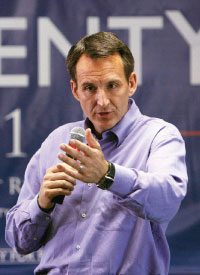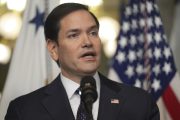
“I shut down a government and won,” Pawlenty said in one TV ad. Another says, “Minnesota government shut down. Why? Because Tim Pawlenty would not accept Democrats’ massive tax and spending demands. Result? Pawlenty won.” At the time, however, the Governor did not sound so triumphant. When the partial shutdown ended after nine days in July of 2005, Pawlenty cautioned against boasting by either side. “Given what the state’s been through, anybody who tries to spin this as a partisan victory should be ashamed of himself or herself,” he said at a press conference. The budget standoff ended when Pawlenty and the Democrats agreed to a 75-cent increase in the cigarette tax, an increase Pawlenty had proposed near the end of the regular session of the Legislature. It was revived during the special session as a way to help pay for public health programs. Pawlenty wouldn’t call it a tax hike, though.
“I remember him, in pencil, crossing out ‘cigarette tax’ and writing down ‘health impact fee,’” Dean Johnson, then the Senate Majority Leader, recalled in an interview with the Associated Press this July. The wording was important, since Pawlenty, as a candidate in 2002, had signed the Taxpayer League of Minnesota’s no new taxes pledge. “Knowing what I know right now, it looks a lot more like a cigarette tax increase than a health impact fee,” David Strom, the group’s leader said at the time.
In his first year as Governor, Pawlenty inherited a $4.3 billion projected two-year deficit, the largest in Minnesota history at that time. He also came up against a long-established tradition of big budget increases in Minnesota. “From 1960, the year I was born, until the time I became Governor in 2003, the average two-year increase in Minnesota state spending was 21 percent,” Pawlenty wrote in his autobiography, Courage to Stand: An American Story. “We brought that down dramatically, to about 1.7 percent per year.”?The spending restraints and budget-balancing achieved during Pawlenty’s eight years at the helm, however, were achieved in part through accounting maneuvers like deferring school spending, borrowing from the tobacco settlement money meant for healthcare, and by the $2.3 billion the state received in federal stimulus money. Pawlenty also managed to outmaneuver the Democratic Legislature, signing every spending bill in the spring of 2009, then vetoing the revenue bill to pay for them, a bill that included a tax increase on the wealthy. Then he invoked emergency powers to balance the budget by making unilateral cuts of $2.7 billion. In May of last Year, the Minnesota Supreme Court ruled the cuts exceeded the Governor’s powers under the state’s Constitution.
Supporters credit Pawlenty with balancing the budget during recession without raising taxes. The Governor vetoed a record 299 bills during his two terms. Since leaving office in January, he has taken political heat for new budget shortfalls and for this summer’s 20-day shutdown of government that cost the state its AAA credit rating. It ended on July 20, when Democratic Governor Mark Dayton signed a $35.7 billion budget, passed by what is now a Republican-controlled Legislature. Both Dayton and former Republican Governor Arne Carlson have blamed Pawlenty for using budget gimmickry to, in Carlson’s words, “kick the can down the road” and leave the costs to the next administration.
“The last budget for which I was governor ends tonight at midnight, and it’s going to end in the black; it’s going to end with a surplus,” Pawlenty said as the fiscal year ended on July 1. “And as to the next budget that has a projected deficit, it’s based on a massive increase in spending that I would have never allowed as governor.”
A native of Saint Paul, Pawlenty graduated from the University of Minnesota and the university’s law school. He practiced law as a labor attorney and was vice president of a software company. Having settled with his wife in the city of Eagan, Pawlenty served on the city’s planning commission and was elected to the Eagan City Council. He was elected four times to the state House of Representatives and was elected Majority Leader in 1998. He narrowly won the Republican primary for Governor in 2002, then won in a three-way race in November. In 2006, he was reelected by a margin of just one percent.
In 2008, Pawlenty was out on the stump as a spokesman for McCain, and in that role defended the Wall Street bailout, a position he has disavowed in his own campaign.
When he announced his candidacy for President, Pawlenty called for the phasing out of federal energy subsidies, including those for ethanol — though in 2005 he pushed for and signed into law a mandate doubling the ethanol content required for gasoline in Minnesota to 20 percent. He promised to take on what is often called the “third rail” in American politics, Social Security reform. “I’ll tell young people the truth that over time and for them only, we’re going to gradually raise their Social Security retirement age. And, I’ll also tell the truth to wealthy seniors that we will means test Social Security’s annual cost-of-living adjustment.” He made no mention of military spending.
In an address to the Council on Foreign Relations in June, Pawlenty warned that “parts of the Republican party now seem to be trying to outbid the Democrats in appealing to isolationist sentiments.” He endorsed Western military action against Libya, but blamed Obama for not organizing the NATO air attacks sooner and for “leading from behind.” Expressing optimism about the “Arab spring,” Pawlenty said America should be encouraging freedom movements in the Middle East and the development of Western-style democracies: “We should press new friends in the region to end discrimination against women, to establish independent courts, and freedom of speech and the press.”
Asked during a Meet the Press interview if he believed going into Iraq was a mistake, Pawlenty conceded the war started with an “incorrect premise”:
But if you look at it in terms of the impact upon history, and the positive that could still come out of it, it may turn out to have been beneficial…. We don’t want to be Pollyanna-ish, but can we have some semblance of a reasonably functioning, democratically elected, somewhat self-reliant government? Maybe. It’s worth playing out the hand.
Pawlenty opposes same-sex “marriage” and would seek reinstatement of the “don’t ask, don’t tell” policy concerning homosexuals serving in the military. He opposes legalized abortion, except in cases of rape, incest, or when the life of the mother is at stake. As Governor, he supported and signed into law the Positive Alternatives Act, which provides state funding to organizations that provide support and assistance to women seeking alternatives to abortion. He also signed the Women’s Right to Know Act, requiring informed consent and a 24-hour waiting period before an abortion. Minnesota Concerned Citizens for Life credits those and other pro-life initiatives for a 7.1 percent drop last year in the number of abortions in the state. The 11,505 abortions in 2010 was the lowest in Minnesota since 1975, according to statistics from the Minnesota Department of Health.
By mid-summer, Pawlenty was still stalled in the low single-digits in the polls, with a July 27 Gallup poll showing him tied with Jon Huntsman and Rick Santorum at three percent. He has so far been unable to gain traction against frontrunner Mitt Romney or Michele Bachmann, a Tea Party favorite whose media coverage and poll rankings have thus far dwarfed those of her fellow Minnesotan.
Asked earlier in the campaign if he could compete with Congresswoman Bachmann for media attention, Pawlenty replied, “I’m not running for comic — or entertainer-in-chief.”
— Photo: AP Images


